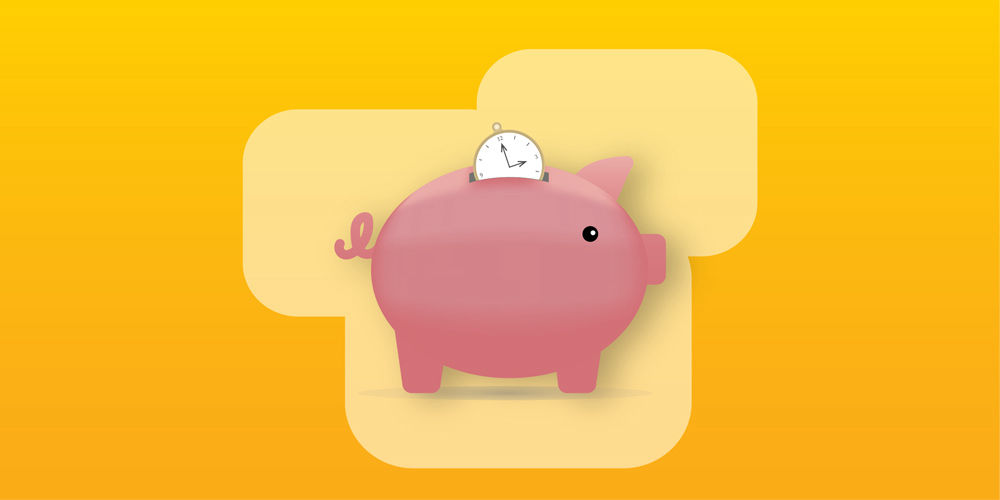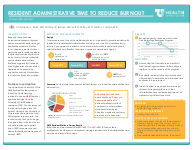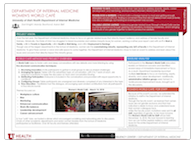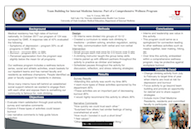 Resident Administrative Time to Reduce Burnout
Resident Administrative Time to Reduce Burnout
Team: Christopher J. Ricks, Michael K. Burrow, Jeff H. Pettey , and Griffin J. Jardine . Moran Eye Center.
Some records are exciting to break. Breaking the system’s record for highest rate of resident burnout, however, is not one of them. That’s where Griffin Jardine and colleagues found themselves after the 2017 GME Wellness Survey identified that 80% of their residents were experiencing burnout.
Ophthalmology began an improvement project as part of the Resiliency Center’s Wellness Champions program. Drawing from national studies that indicated the greatest contributing factor for trainees as a lack of control over one’s schedule, the team set out to institute monthly administrative “half-days,” which would grant residents discretionary time to use as needed.
This required garnering buy-in from the department and faculty to administer, but the results have been well worth it. In fact, in the twelve months since the work began, the program has reduced the reported rate of burnout to 30%. All residents who participated indicated that the half-days were extremely beneficial–more so, in fact, than other wellness activities offered.
The final outcomes resulted in the first place award at the Resiliency Center’s 2018 poster session.
 Women’s World Café
Women’s World Café
Team: Dori Knight, Mandy Skonhovd, Aaron Bell. University of Utah Health Department of Internal Medicine.
Tarana Burke, civil rights activist and founder of the Me Too movement, defines the challenges women face at home and in the workplace as "community problems–not just women’s problems. And community problems require community solutions."
This past year, the Department of Internal Medicine turned to focus on gender issues impacting the resiliency and wellness of female faculty and trainees as part of the Wellness Champions program. Though the largest department in the School of Medicine, women represent only 36% of faculty.
To foster a sense of community and attempt to bridge gender gaps in the system, Dori Knight and colleagues adopted the World Café Method, which uses structured communication techniques to facilitate open group dialogue. The initial discussion or “Café” that welcomed 50 faculty, chairs from a number of different departments, and female senior leaders was so well received, that it was later expanded to include a staff “Café” as well. This time, however, since community problems require community solutions–all genders were invited to attend.
 Team Building for Internal Medicine Interns: Part of a Comprehensive Wellness Program
Team Building for Internal Medicine Interns: Part of a Comprehensive Wellness Program
Lead: Amy N. Cowan. Salt Lake City Veterans Administration and U of U Health Department of Internal Medicine.
University of Utah Internal Medicine residents are not immune from burnout, with 60% reporting burnout symptoms in the October 2017 GME Survey. That’s about 15% above the national average.
In response, hospitalist Amy Cowan led a project to fill a void many residents experience when they begin training–lack of community. Since many trainees leave their social support networks behind, traveling to a new place with new faces, she saw an opportunity to blend Utah’s natural beauty with team building using rock climbing as the activity.
Over the course of 5 weeks, 55 interns divided into small teams that completed a curriculum designed to relate the rock climbing skills of problem solving, emotional regulation, asking for help, and communication (both verbal and non-verbal), to medicine. The post-program feedback was glowing, prompting Cowan and leadership to carry the work forward. In the next round, the activity will be moved to the winter months to align with the time of year when interns are most at risk.
2019 Resiliency Center Wellness Champion Program
The Resiliency Center’s Wellness Champion Program aims to reduce burnout and optimize the wellbeing of faculty and staff at University of Utah Health. New in 2019, the program will provide support and coaching in identifying areas of need to achieve the greatest impact, determine metrics of success, as well as provide funding for all projects.
To learn more or to apply, access the Application here.
Accelerate Editorial Team
Family physician and Resiliency Center co-director Amy Locke draws from personal experience and evidence-based research that supports two approaches for making your practice more efficient.
University of Utah Health is committed to tackling a major problem in health care today: burnout. Last year, 40 teams spread across an enormous health system took on the challenge. We sat down with family physician and co-director of the Resiliency Center Amy Locke to learn about what works in improving faculty and staff wellness.
Terry Tempest Williams is a Utah native, writer, naturalist, activist, educator—and patient. Here, Terry shares the many ways artists and authors are responding to the full range of emotions of life during COVID-19.



